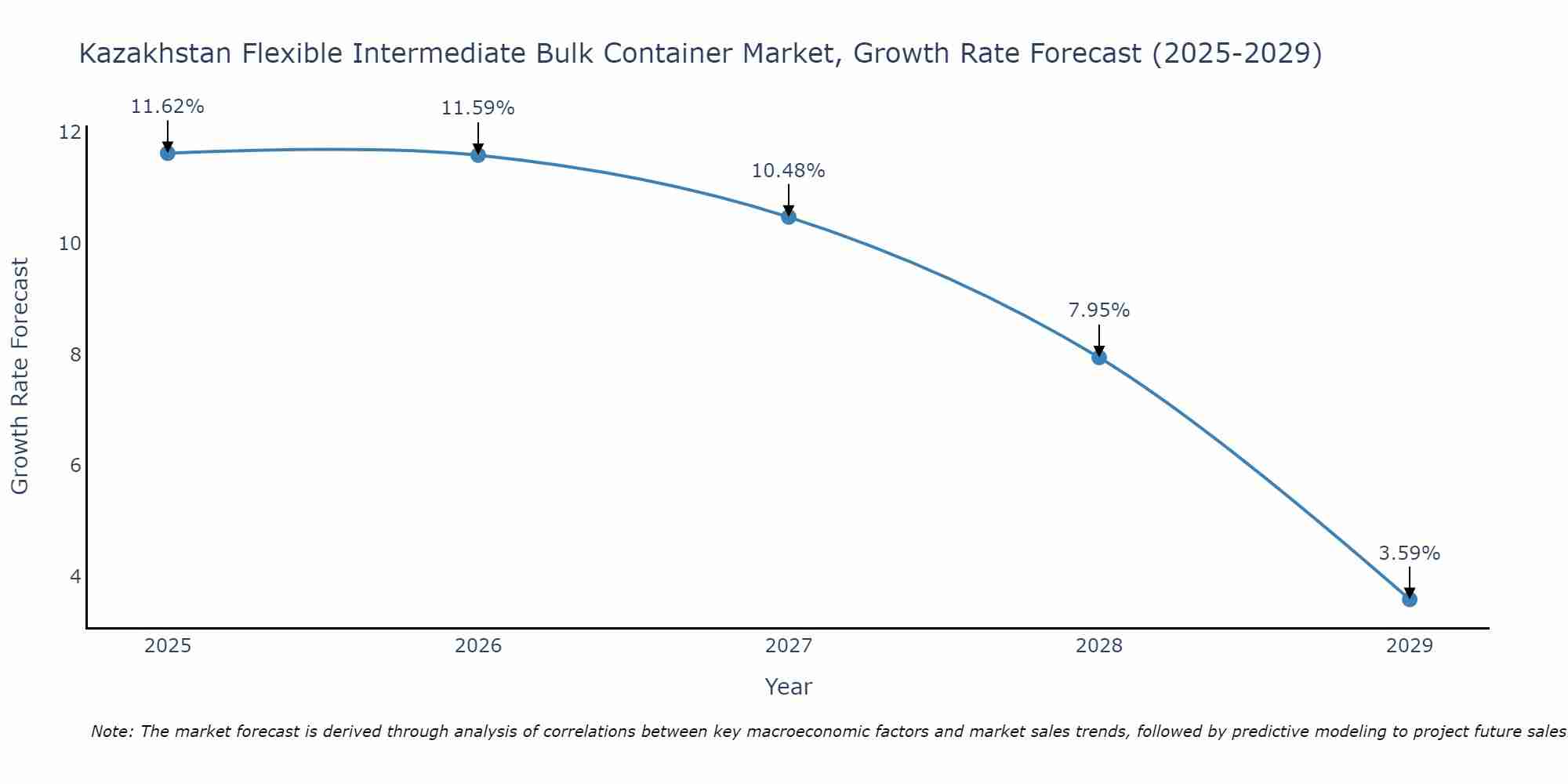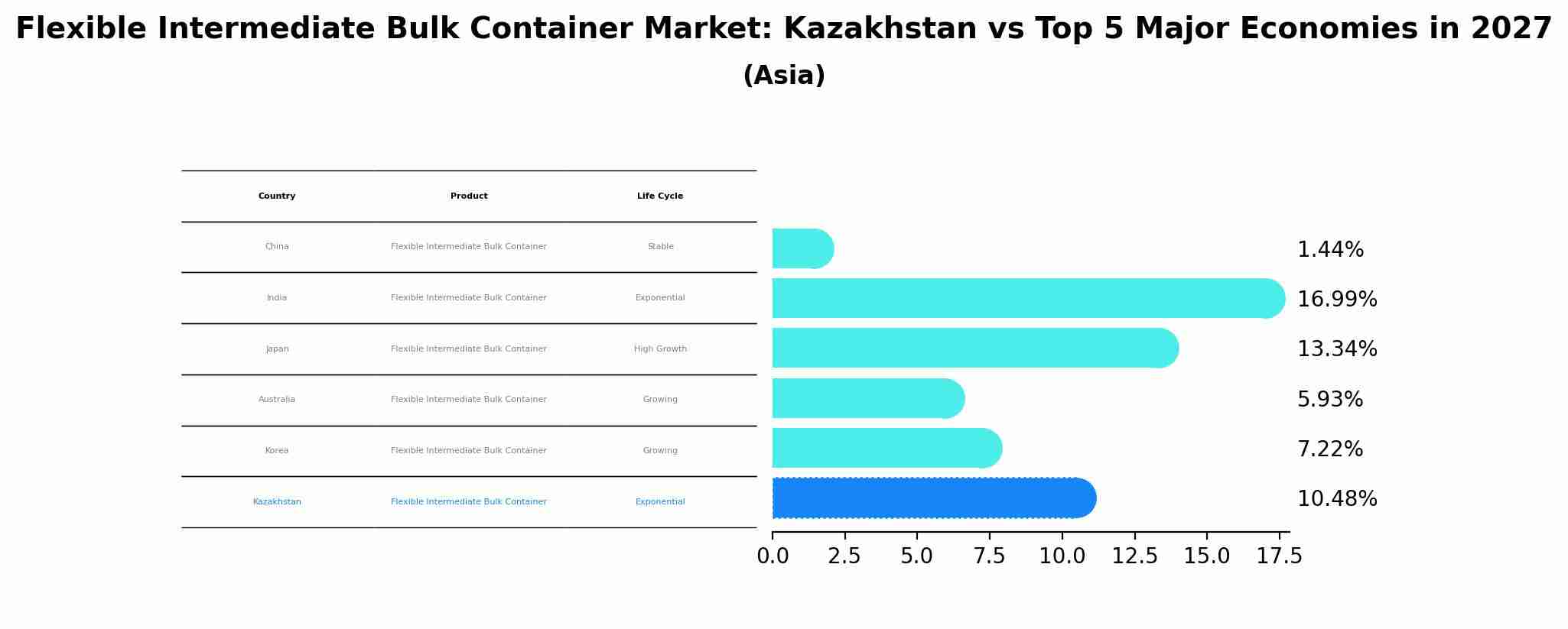Kazakhstan Flexible Intermediate Bulk Container Market Outlook | Growth, Share, COVID-19 IMPACT, Industry, Revenue, Value, Size, Companies, Forecast, Trends & Analysis
| Product Code: ETC373918 | Publication Date: Aug 2022 | Updated Date: Jul 2025 | Product Type: Market Research Report | |
| Publisher: 6Wresearch | Author: Sumit Sagar | No. of Pages: 75 | No. of Figures: 35 | No. of Tables: 20 |
Kazakhstan Flexible Intermediate Bulk Container Market Size Growth Rate
The Kazakhstan Flexible Intermediate Bulk Container Market may undergo a gradual slowdown in growth rates between 2025 and 2029. Beginning strongly at 11.62% in 2025, growth softens to 3.59% in 2029.

Flexible Intermediate Bulk Container Market: Kazakhstan vs Top 5 Major Economies in 2027 (Asia)
In the Asia region, the Flexible Intermediate Bulk Container market in Kazakhstan is projected to expand at a high growth rate of 10.48% by 2027. The largest economy is China, followed by India, Japan, Australia and South Korea.

Kazakhstan Flexible Intermediate Bulk Container Market Synopsis
The Kazakhstan Flexible Intermediate Bulk Container (FIBC) market is experiencing steady growth driven by factors such as the expanding agriculture, construction, and chemical industries in the region. FIBCs are widely used for bulk transportation and storage of goods due to their cost-effectiveness, durability, and eco-friendly nature. The market is witnessing increased demand for FIBCs with features like UV protection, antistatic properties, and food-grade certifications. Key players in the Kazakhstan FIBC market are focusing on product innovation, customization, and strategic partnerships to gain a competitive edge. Additionally, government initiatives promoting the use of sustainable packaging solutions are expected to further fuel the market growth in the coming years.
Kazakhstan Flexible Intermediate Bulk Container Market Trends
The Kazakhstan Flexible Intermediate Bulk Container (FIBC) market is experiencing growth driven by factors such as increasing demand in industries like agriculture, construction, and chemicals. Key trends in the market include a shift towards sustainable and eco-friendly FIBCs made from recyclable materials, as companies prioritize environmental responsibility. Technological advancements in FIBC designs, such as improved safety features and enhanced durability, are also shaping the market. Additionally, the adoption of automation and digitalization in FIBC manufacturing processes is streamlining production and enhancing efficiency. Overall, the Kazakhstan FIBC market is expected to continue its growth trajectory, driven by a combination of industry demand, innovation, and sustainability initiatives.
Kazakhstan Flexible Intermediate Bulk Container Market Challenges
In the Kazakhstan Flexible Intermediate Bulk Container (FIBC) market, some challenges include intense competition from both domestic and international manufacturers, fluctuating raw material prices, and regulatory changes in the region impacting manufacturing processes and costs. Additionally, the lack of awareness about the benefits of FIBCs among some end-user industries in Kazakhstan can hinder market growth. Logistics and transportation issues can also pose challenges, particularly in remote regions of the country. Furthermore, ensuring compliance with quality standards and certifications required for exporting FIBCs to international markets is crucial but can be a complex process. Overall, addressing these challenges will be essential for FIBC companies in Kazakhstan to stay competitive and expand their market presence.
Kazakhstan Flexible Intermediate Bulk Container Market Investment Opportunities
The Kazakhstan Flexible Intermediate Bulk Container (FIBC) market presents several investment opportunities due to the country`s growing industrial sector and increasing demand for cost-effective bulk packaging solutions. Investing in FIBC manufacturing facilities or distribution networks could be lucrative, as the market is expected to witness steady growth driven by sectors such as agriculture, construction, and chemicals. Additionally, there is potential for innovation in the FIBC market in Kazakhstan, such as introducing eco-friendly materials or specialized designs to cater to specific industry requirements. With the government`s focus on promoting industrial development and trade, investing in the Kazakhstan FIBC market could offer long-term growth prospects for investors seeking exposure to the country`s expanding industrial landscape.
Jordan Agar Market Government Policies
The Kazakhstan government has implemented various policies related to the Flexible Intermediate Bulk Container (FIBC) market to ensure safety, quality, and environmental sustainability. These policies include regulations on the manufacturing standards of FIBCs to meet international quality requirements and ensure the safety of transported goods. Additionally, there are guidelines in place to promote recycling and proper disposal of used FIBCs to minimize environmental impact. The government also encourages local production of FIBCs through incentives and support programs to boost the domestic industry. Furthermore, import and export regulations are in place to monitor the flow of FIBCs in and out of the country and ensure compliance with international trade standards. Overall, these policies aim to foster a competitive and sustainable FIBC market in Kazakhstan.
Kazakhstan Flexible Intermediate Bulk Container Market Future Outlook
The Kazakhstan Flexible Intermediate Bulk Container (FIBC) market is expected to show steady growth in the coming years due to increasing industrial activities and rising demand for efficient and cost-effective bulk packaging solutions. The market is likely to be driven by sectors such as agriculture, construction, chemicals, and mining, which rely heavily on FIBCs for transportation and storage purposes. Factors such as the growing focus on sustainability and the adoption of advanced technologies in FIBC manufacturing are also expected to contribute to the market`s growth. Additionally, the expanding e-commerce sector in Kazakhstan is anticipated to create new opportunities for FIBC usage in the logistics and transportation of goods. Overall, the Kazakhstan FIBC market is projected to witness positive growth trends in the foreseeable future.
Key Highlights of the Report:
- Kazakhstan Flexible Intermediate Bulk Container Market Outlook
- Market Size of Kazakhstan Flexible Intermediate Bulk Container Market, 2021
- Forecast of Kazakhstan Flexible Intermediate Bulk Container Market, 2031
- Historical Data and Forecast of Kazakhstan Flexible Intermediate Bulk Container Revenues & Volume for the Period 2018 - 2031
- Kazakhstan Flexible Intermediate Bulk Container Market Trend Evolution
- Kazakhstan Flexible Intermediate Bulk Container Market Drivers and Challenges
- Kazakhstan Flexible Intermediate Bulk Container Price Trends
- Kazakhstan Flexible Intermediate Bulk Container Porter's Five Forces
- Kazakhstan Flexible Intermediate Bulk Container Industry Life Cycle
- Historical Data and Forecast of Kazakhstan Flexible Intermediate Bulk Container Market Revenues & Volume By Product for the Period 2018 - 2031
- Historical Data and Forecast of Kazakhstan Flexible Intermediate Bulk Container Market Revenues & Volume By Type A for the Period 2018 - 2031
- Historical Data and Forecast of Kazakhstan Flexible Intermediate Bulk Container Market Revenues & Volume By Type B for the Period 2018 - 2031
- Historical Data and Forecast of Kazakhstan Flexible Intermediate Bulk Container Market Revenues & Volume By Type C for the Period 2018 - 2031
- Historical Data and Forecast of Kazakhstan Flexible Intermediate Bulk Container Market Revenues & Volume By Type D for the Period 2018 - 2031
- Historical Data and Forecast of Kazakhstan Flexible Intermediate Bulk Container Market Revenues & Volume By End-Use for the Period 2018 - 2031
- Historical Data and Forecast of Kazakhstan Flexible Intermediate Bulk Container Market Revenues & Volume By Food for the Period 2018 - 2031
- Historical Data and Forecast of Kazakhstan Flexible Intermediate Bulk Container Market Revenues & Volume By Chemical for the Period 2018 - 2031
- Historical Data and Forecast of Kazakhstan Flexible Intermediate Bulk Container Market Revenues & Volume By Pharmaceuticals for the Period 2018 - 2031
- Historical Data and Forecast of Kazakhstan Flexible Intermediate Bulk Container Market Revenues & Volume By Others for the Period 2018 - 2031
- Kazakhstan Flexible Intermediate Bulk Container Import Export Trade Statistics
- Market Opportunity Assessment By Product
- Market Opportunity Assessment By End-Use
- Kazakhstan Flexible Intermediate Bulk Container Top Companies Market Share
- Kazakhstan Flexible Intermediate Bulk Container Competitive Benchmarking By Technical and Operational Parameters
- Kazakhstan Flexible Intermediate Bulk Container Company Profiles
- Kazakhstan Flexible Intermediate Bulk Container Key Strategic Recommendations
Frequently Asked Questions About the Market Study (FAQs):
- Single User License$ 1,995
- Department License$ 2,400
- Site License$ 3,120
- Global License$ 3,795
Search
Related Reports
- ASEAN Bearings Market (2025-2031) | Strategy, Consumer Insights, Analysis, Investment Trends, Opportunities, Growth, Size, Share, Industry, Revenue, Segments, Value, Segmentation, Supply, Forecast, Restraints, Outlook, Competition, Drivers, Trends, Demand, Pricing Analysis, Competitive, Strategic Insights, Companies, Challenges
- Europe Flooring Market (2025-2031) | Outlook, Share, Industry, Trends, Forecast, Companies, Revenue, Size, Analysis, Growth & Value
- Saudi Arabia Manlift Market (2025-2031) | Outlook, Size, Growth, Trends, Companies, Industry, Revenue, Value, Share, Forecast & Analysis
- Uganda Excavator, Crane, and Wheel Loaders Market (2025-2031) | Strategy, Consumer Insights, Analysis, Investment Trends, Opportunities, Growth, Size, Share, Industry, Revenue, Segments, Value, Segmentation, Supply, Forecast, Restraints, Outlook, Competition, Drivers, Trends, Demand, Pricing Analysis, Competitive, Strategic Insights, Companies, Challenges
- Rwanda Excavator, Crane, and Wheel Loaders Market (2025-2031) | Strategy, Consumer Insights, Analysis, Investment Trends, Opportunities, Growth, Size, Share, Industry, Revenue, Segments, Value, Segmentation, Supply, Forecast, Restraints, Outlook, Competition, Drivers, Trends, Demand, Pricing Analysis, Competitive, Strategic Insights, Companies, Challenges
- Kenya Excavator, Crane, and Wheel Loaders Market (2025-2031) | Strategy, Consumer Insights, Analysis, Investment Trends, Opportunities, Growth, Size, Share, Industry, Revenue, Segments, Value, Segmentation, Supply, Forecast, Restraints, Outlook, Competition, Drivers, Trends, Demand, Pricing Analysis, Competitive, Strategic Insights, Companies, Challenges
- Angola Excavator, Crane, and Wheel Loaders Market (2025-2031) | Strategy, Consumer Insights, Analysis, Investment Trends, Opportunities, Growth, Size, Share, Industry, Revenue, Segments, Value, Segmentation, Supply, Forecast, Restraints, Outlook, Competition, Drivers, Trends, Demand, Pricing Analysis, Competitive, Strategic Insights, Companies, Challenges
- Israel Intelligent Transport System Market (2025-2031) | Strategy, Consumer Insights, Analysis, Investment Trends, Opportunities, Growth, Size, Share, Industry, Revenue, Segments, Value, Segmentation, Supply, Forecast, Restraints, Outlook, Competition, Drivers, Trends, Demand, Pricing Analysis, Competitive, Strategic Insights, Companies, Challenges
- Uganda Precast and Aggregate Market (2025-2031) | Strategy, Consumer Insights, Analysis, Investment Trends, Opportunities, Growth, Size, Share, Industry, Revenue, Segments, Value, Segmentation, Supply, Forecast, Restraints, Outlook, Competition, Drivers, Trends, Demand, Pricing Analysis, Competitive, Strategic Insights, Companies, Challenges
- Australia IT Asset Disposal Market (2025-2031) | Strategy, Consumer Insights, Analysis, Investment Trends, Opportunities, Growth, Size, Share, Industry, Revenue, Segments, Value, Segmentation, Supply, Forecast, Restraints, Outlook, Competition, Drivers, Trends, Demand, Pricing Analysis, Competitive, Strategic Insights, Companies, Challenges
Industry Events and Analyst Meet
Our Clients
Whitepaper
- Middle East & Africa Commercial Security Market Click here to view more.
- Middle East & Africa Fire Safety Systems & Equipment Market Click here to view more.
- GCC Drone Market Click here to view more.
- Middle East Lighting Fixture Market Click here to view more.
- GCC Physical & Perimeter Security Market Click here to view more.
6WResearch In News
- Doha a strategic location for EV manufacturing hub: IPA Qatar
- Demand for luxury TVs surging in the GCC, says Samsung
- Empowering Growth: The Thriving Journey of Bangladesh’s Cable Industry
- Demand for luxury TVs surging in the GCC, says Samsung
- Video call with a traditional healer? Once unthinkable, it’s now common in South Africa
- Intelligent Buildings To Smooth GCC’s Path To Net Zero













